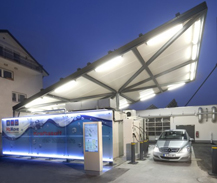Solar Powering Cars without Batteries
 Fraunhofer ISE has inaugurated a new hydrogen refueling station demonstration project. The refueling station is publicly accessible, providing one more place for fuel cell electric vehicles or vehicles with hydrogen-burning combustion engines to get their hydrogen fix.
Fraunhofer ISE has inaugurated a new hydrogen refueling station demonstration project. The refueling station is publicly accessible, providing one more place for fuel cell electric vehicles or vehicles with hydrogen-burning combustion engines to get their hydrogen fix.Different types of fuel cells that can utilize different fuels, but this refueling station is just for hydrogen fuel cells, which generate electricity that then powers the electric vehicles’ motors.
Due to the intermittency of wind and solar power, it is good to find ways in which these renewable power supplies can be utilized without energy storage systems such as batteries, compressed air (CAES), etc. One way is the production of hydrogen via electrolysis, which is what the Fraunhofer hydrogen refueling station does. At this refueling station, electricity form the solar panels is used to power an electrolyzer, which passes an electric current through water, causing it to liberate hydrogen. (If you don’t remember, water (or H2O) is made up of water molecules, each of which contains 2 hydrogen atoms and 1 oxygen atom. During electrolysis, hydrogen bubbles out of the water at the cathode, and oxygen bubbles out at the anode.)
The hydrogen produced while the sun is shining is stored in tanks for later use at night, or during cloudy weather.
Apart from the above, the solar panel system Fraunhofer is using for this station is a grid-tie setup, meaning that the solar panels supply electricity to the power grid and reverse the electricity meter to offset the power consumption of the station. The Fraunhofer setup only partially offsets its power consumption, but it is a start. Innovatively, the solar panels also act as the roof and ceiling of the station.
The main components of this hydrogen station are an electrolyzer that operates at a pressure of 30 bar (435 psi), a 700-bar (10,152 psi) hydrogen compressor, puffer storage at two different levels, and hydrogen pumps.
Hydrogen fuel (when produced by renewable and clean energy) certainly has some advantages over battery electric vehicle technology, but it has its downsides as well. Hydrogen fuel cells are extremely expensive, but reasonably efficient; combustion engines, which hydrogen can power, are affordable, but inefficient and unreliable.
You can return to the main Market News page, or press the Back button on your browser.

